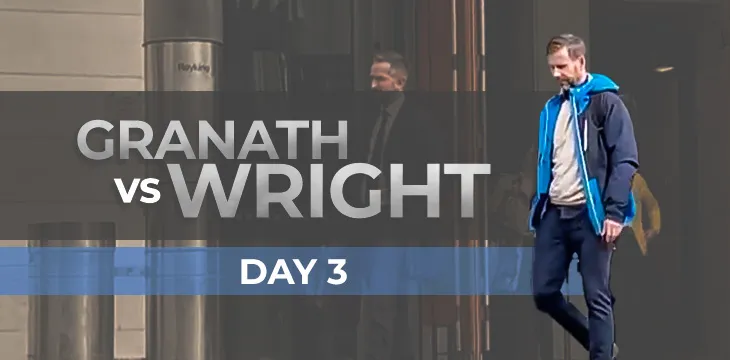|
Getting your Trinity Audio player ready...
|
After a relatively pedestrian opening couple of days for the Granath v Wright trial, both the plaintiff (Magnus Granath) and defendant (Dr. Craig Wright) took the stand in a revealing third day in Oslo.
Granath was first up. Thus far in trial, all that’s been heard from Granath has come via the tweets at the core of the case, which were covered extensively by Dr. Wright’s lawyers’ opening statement yesterday. On Wednesday, he was confronted with his online statements—and doubled down on the views expressed within them. Despite claiming to not be interested in the identity of Satoshi, he said that the tweets represent views he really holds, though concedes that they were emotional responses.
The examination was revealing. Halvor Manshaus, acting for Dr. Wright, asked Granath about the absence of any evidence within the tweets that would justify the names he was calling Dr. Wright. Granath flatly agreed, admitting he made no attempt to provide his basis. He said he was claiming the statements as truth because that was simply the consensus in his ‘environment.’ When asked by the Judge what that environment is, he answered that it was “people who believe BTC is Bitcoin.”
In other words, Granath doesn’t need to justify any of his claims, because his audience—the BTC crowd—don’t need to read it. They already know that Dr. Wright is a fraud, according to Hodlonaut. It was a low moment for Granath considering his case depends on demonstrating that he had a factual basis for his statements, and that part of his justification (on paper) is that he is performing some sort of journalistic public service.
The same disconnect between Granath’s case on paper and reality came up again, when he was asked about a tweet in which he advocated for “appreciation and gratitude to the rabid and toxic Bitcoin maximalists.” He stood by this in court, saying that the attitude of so-called BTC maximalists is that there’s Bitcoin and then there are ‘shitcons,’ and that instead of getting angry at being toxic, the maximalists wear it like a badge of honour.
In other words, this discourse is simply a fact of life in his online tribe, and victims like Dr. Wright should accept it.
Perhaps the most ironic moment in the trial so far came when Granath was asked by the Judge why being called a ‘crypto troll’—as Granath complained he had been called—was worse than being called a fraud, as he had labelled Dr. Wright. He said that he doesn’t think it is, saying instead that what he finds the worst is to be made a public person against his will, exposing him to personal attacks from online detractors.
Which is, of course, exactly what happened to Dr. Wright when he was doxed by Wired and Gizmodo in 2015, an event which set Granath’s anonymous Twitter account on a crash course with Dr. Wright, a private citizen trying to get on with his life’s work. Granath didn’t appear to notice the role he had played in exposing Dr. Wright to the same attacks (and worse) that he complains about.
The second half of the day saw Dr. Wright step into the witness box. Like Granath, it was the first time we’d heard from Dr. Wright through the trial so far. That meant that the court was treated to the full extent of the impact Granath’s campaign had on Dr. Wright.
It was a tough listen. Wright said that following the start of Granath’s attacks, he received a deluge of abuse which included personal messages sent to which contained graphic and racist threats aimed at his wife and daughter. He spoke of how he has been bullied through high school due to his autism: “That’s all this is,” he said, referring to Granath’s tweets. “It’s a person encouraging other bullies to harass people over the internet. People commit suicide. People like this are attempting to bully others into submission.”
This was made worse by the fact that the attacks were originating from a pseudonymous Twitter account, he says. Twitter’s refusal to take action didn’t help.
But Dr. Wright’s testimony wasn’t all gloom. Halvor Manshaus asked Dr. Wright to explain evidence showing that the Bitcoin white paper came from him. This included the BDO meeting minutes which appeared in Kleiman, which record a meeting Dr. Wright had with his superiors at BDO in which he pitched the idea of Bitcoin in the hopes that the firm would fund it. But the court was also shown a document consisting of dozens of pages of handwritten notes dated from August 2007: the notes are essentially a primitive version of the Bitcoin white paper.
Despite this, large parts of Dr. Wright’s examination were still spent on why Dr Wright can’t just prove his identity using Satoshi’s keys. Dr. Wright explained—as he’s done in many contexts—that keys do not prove identity, just like possessing car keys don’t prove your ownership over the car. Proving identity is far more involved—as Dr. Wright is showing by producing a collection of evidence including by those who can attest to his authorship of Bitcoin first-hand. He signed for Gavin Andresen privately—a signing Gavin still maintains was authentic—and destroyed the drives on which the keys were stored for the demonstration immediately afterward.
Still, Dr. Wright says, people want to take “the easy way out”—they want a simple proof that Dr. Wright is Satoshi, one that requires no active thought or engagement. Those people, it appears, will remain forever disappointed.
The trial continues tomorrow at 9 a.m. CET in Norway.
Watch Granath vs Wright Satoshi Norway Trial Coverage Livestream Day 3:

 08-17-2025
08-17-2025 





